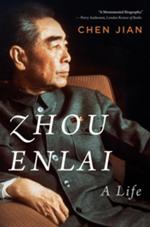The definitive biography of Zhou Enlai, the first premier and preeminent diplomat of the People’s Republic of China, who protected his country against the excesses of his boss-Chairman Mao. Zhou Enlai spent twenty-seven years as premier of the People’s Republic of China and ten as its foreign minister. He was also its legendary spymaster. Richard Nixon proclaimed him ‘the greatest statesman of our era.’ Yet Zhou has always been overshadowed by Chairman Mao. Chen Jian brings Zhou into the light, offering a nuanced portrait of a revolutionary and master diplomat whose vision shaped China and the broader world. Born to a declining mandarin family in 1898, Zhou received a classical education and as a teenager spent time in modernizing Japan. Zhou embraced communist revolution as a vehicle for China’s own development, yet Zhou was never a committed Maoist. While he worked closely with the chairman, he used his extraordinary political and bureaucratic skill to mitigate the damage caused by Mao’s radicalism and maintain China’s international standing. When Zhou died in 1976, the China we know today was not yet visible on the horizon. He never saw a glistening Shanghai skyline or the emergence of Chinese capitalism. But the Chinese influence now felt in every corner of the globe rests on Zhou’s work.

Zhou enlai: a life
ISBN: 9780674303492
Format: Paperback
Publisher: Harvard University Press
Origin: US
Release Date: January, 2026
166817

